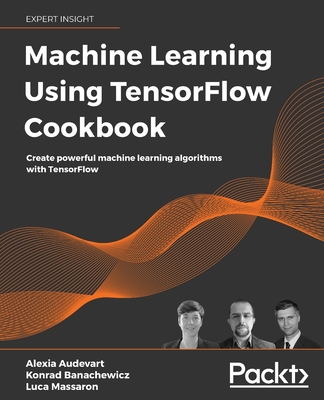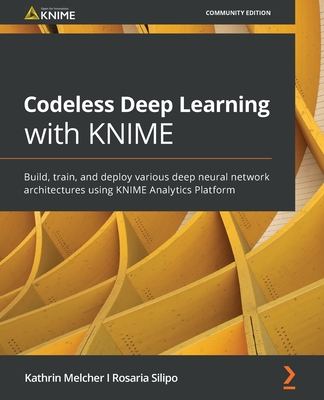Predictive Analytics with TensorFlow
暫譯: 使用 TensorFlow 進行預測分析
Md. Rezaul Karim
- 出版商: Packt Publishing
- 出版日期: 2017-10-26
- 售價: $1,840
- 貴賓價: 9.5 折 $1,748
- 語言: 英文
- 頁數: 522
- 裝訂: Paperback
- ISBN: 1788398920
- ISBN-13: 9781788398923
-
相關分類:
TensorFlow
海外代購書籍(需單獨結帳)
買這商品的人也買了...
-
 類神經網路與模糊控制理論入門與應用
類神經網路與模糊控制理論入門與應用$350$315 -
 Fluent Python (Paperback)
Fluent Python (Paperback)$2,130$2,023 -
 TensorFlow: Powerful Predictive Analytics with TensorFlow
TensorFlow: Powerful Predictive Analytics with TensorFlow$1,660$1,577 -
 $990Web Scraping with Python: Collecting More Data from the Modern Web, 2/e (Paperback)
$990Web Scraping with Python: Collecting More Data from the Modern Web, 2/e (Paperback) -
 Hands-On Automated Machine Learning: A beginner's guide to building automated machine learning systems using AutoML and Python
Hands-On Automated Machine Learning: A beginner's guide to building automated machine learning systems using AutoML and Python$1,380$1,311 -
 $234AlphaGo 如何戰勝人類圍棋大師 — 智能硬件 TensorFlow 實踐
$234AlphaGo 如何戰勝人類圍棋大師 — 智能硬件 TensorFlow 實踐 -
 Python 機器學習, 2/e (Python Machine Learning, 2/e)
Python 機器學習, 2/e (Python Machine Learning, 2/e)$690$538 -
 $1,308Applied Deep Learning: A Case-Based Approach to Understanding Deep Neural Networks
$1,308Applied Deep Learning: A Case-Based Approach to Understanding Deep Neural Networks
商品描述
Key Features
- A quick guide to gain hands-on experience with deep learning in different domains such as digit/image classification, and texts
- Build your own smart, predictive models with TensorFlow using easy-to-follow approach mentioned in the book
- Understand deep learning and predictive analytics along with its challenges and best practices
Book Description
Predictive decisions are becoming a huge trend worldwide catering wide sectors of industries by predicting which decisions are more likely to give maximum results. The data mining, statistics, machine learning allows users to discover predictive intelligence by uncovering patterns and showing the relationship among the structured and unstructured data. This book will help you build solutions which will make automated decisions. In the end tune and build your own predictive analytics model with the help of TensorFlow.
This book will be divided in three main sections.
In the first section-Applied Mathematics, Statistics, and Foundations of Predictive Analytics; will cover Linear algebra needed to getting started with data science in a practical manner by using the most commonly used Python packages. It will also cover the needed background in probability and information theory that is must for Data Scientists.
The second section shows how to develop large-scale predictive analytics pipelines using supervised (classification/regression) and unsupervised (clustering) learning algorithms. It'll then demonstrate how to develop predictive models for NLP. Finally, reinforcement learning and recommendation system will be used for developing predictive models.
The third section covers practical mastery of deep learning architectures for advanced predictive analytics: including Deep Neural Networks (MLP & DBN) and Recurrent Neural Networks for high-dimensional and sequence data. Finally, it'll show how to develop Convolutional Neural Networks- based predictive models for emotion recognition, image classification, and sentiment analysis.
So in total, this book will help you control the power of deep learning in diverse fields, providing best practices and tips from the real world use cases and helps you in decision making based on predictive analytics.
What you will learn
- Get solid and theoretical understanding of linear algebra, statistics, and probability theory for predictive analytics
- Learn practical predictive analytics using machine learning algorithms (classification, regression, and clustering) in order to avoid pitfalls and fallacies
- Discern how to develop predictive models for NLP
- Get practical know-how of deep learning architectures for advanced predictive analytics using Deep Neural Networks (MLP and DBN) for predictive analytics
- Emotion recognition, image classification, and sentiment analysis using convolutional neural networks
- Use Recurrent Neural Networks and reinforcement learning for predictive analytics
- Develop recommendation systems for predictive analytics
商品描述(中文翻譯)
關鍵特點
- 快速指南,讓您在數位/影像分類和文本等不同領域獲得深度學習的實作經驗
- 使用書中提到的簡單方法,利用 TensorFlow 建立自己的智能預測模型
- 理解深度學習和預測分析及其挑戰與最佳實踐
書籍描述
預測決策正在全球範圍內成為一個巨大的趨勢,滿足各行各業的需求,通過預測哪些決策更有可能產生最大結果。數據挖掘、統計學和機器學習使得用戶能夠通過揭示模式和顯示結構化與非結構化數據之間的關係來發現預測智能。本書將幫助您建立能夠自動做出決策的解決方案。最終,您將在 TensorFlow 的幫助下調整並建立自己的預測分析模型。
本書將分為三個主要部分。
第一部分 - 應用數學、統計學和預測分析基礎;將涵蓋開始數據科學所需的線性代數,並使用最常用的 Python 套件以實用的方式進行。它還將涵蓋數據科學家必須具備的概率和信息理論的背景知識。
第二部分展示如何使用監督式(分類/回歸)和非監督式(聚類)學習算法開發大規模的預測分析管道。然後將演示如何為自然語言處理(NLP)開發預測模型。最後,將使用強化學習和推薦系統來開發預測模型。
第三部分涵蓋高級預測分析的深度學習架構的實用掌握:包括深度神經網絡(MLP 和 DBN)和遞迴神經網絡,適用於高維和序列數據。最後,將展示如何開發基於卷積神經網絡的預測模型,用於情感識別、影像分類和情緒分析。
因此,總的來說,本書將幫助您掌握深度學習在各個領域的力量,提供來自實際案例的最佳實踐和建議,並幫助您基於預測分析做出決策。
您將學到的內容
- 獲得線性代數、統計學和概率論在預測分析中的扎實理論理解
- 學習使用機器學習算法(分類、回歸和聚類)進行實用的預測分析,以避免陷阱和謬誤
- 辨別如何為自然語言處理(NLP)開發預測模型
- 獲得深度學習架構的實用知識,使用深度神經網絡(MLP 和 DBN)進行高級預測分析
- 使用卷積神經網絡進行情感識別、影像分類和情緒分析
- 使用遞迴神經網絡和強化學習進行預測分析
- 開發預測分析的推薦系統










